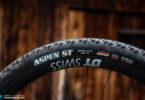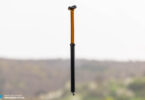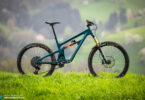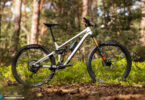Do you even need a full suspension mountain bike to have fun on the trail? With their progressive Stoic hardtail, Canyon want to offer an accessible gateway to the trail riding dimension. Retailing at € 1,699, the Stoic 4 features an alloy frame, rolls on 29” wheels and offers 140 mm travel at the front. After putting the Canyon through the wringer, we can tell you whether it’s a sensible and affordable alternative to a full suspension bike or even just an exciting trail rocket!
For an overview of the test fleet head to the group test: The best mountainbike of 2021 – 22 models in review
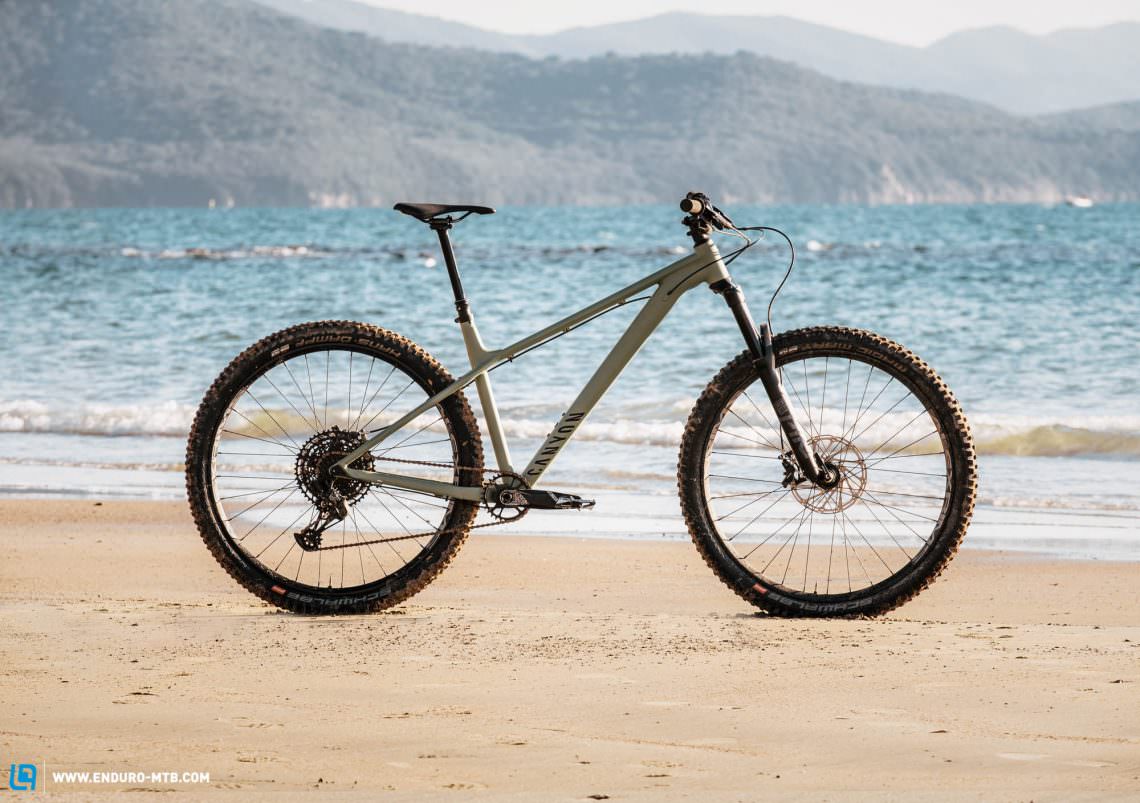
13.76 kg (size L) | € 1,699 | Manufacturer-website
In our search for the best mountain bike of 2021, we couldn’t possibly leave out this year’s most hotly-debated hardtail amongst our readers, the Canyon Stoic. Presenting itself in a discreet green finish, it combines 29” wheels with 140 mm travel at the front. The hardtail of the German direct-sales brand was developed to offer an accessible entry to mountain biking and cut a good figure on trails and long rides as well as pump tracks and dirt jumps.
The overall build quality of the aluminium frame with its pronounced welds feels quite rudimentary, even in light of the comparatively cheap price of € 1,699. The rear brake line is routed externally and held in place on the top tube with zip ties. The shift and dropper cables are routed internally, though the cable ports are positioned far down the downtube. This creates a rather odd-looking curve in the cables around the cockpit and leaves the cables free to rub against the frame despite the internal clamps and zip ties. Unfortunately, Canyon deliver the Stoic without a proper chainstay protector, using a thin plastic film to protect the paint instead. Needless to say, the Stoic plays a phenomenal chain slap concert on the trail. We recommend applying a generous amount of mastic tape before taking your Stoic to the trail!
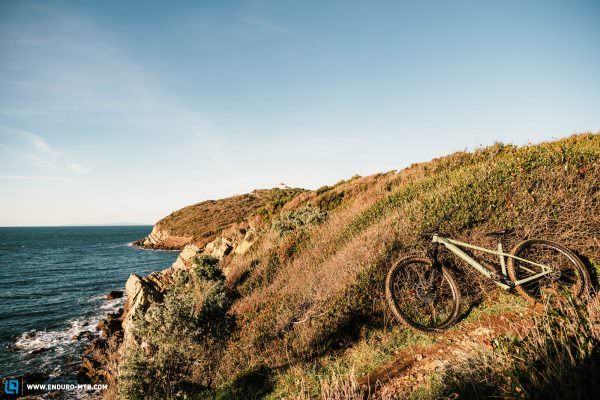
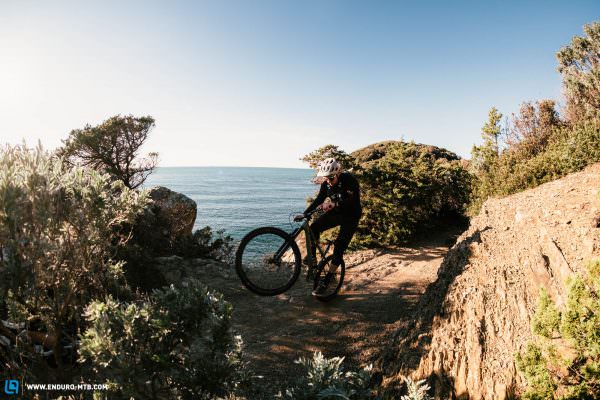
The spec of our Canyon Stoic 4
Retailing at € 1,699, the 13.8 kg Stoic 4 is the top-spec model in the Stoic range, which starts at just € 899. At the front, a RockShox Pike RC fork controls 140 mm of travel. However, the fork feels harsh compared to the Select+ and Ultimate models, featuring a rebound and low-speed compression adjuster. Braking is taken care of by SRAM Guide T brakes paired with a 200 mm rotor at the front and a smaller 180 mm disc out back. Unfortunately, the brakes aren’t suitable for long trail sessions because they tend to overheat quickly, resulting in a wandering bite point and significant loss in braking power. A 12-speed SRAM NX rear derailleur with matching lever shifts gears on a cheaper and heavier 11-50 t SX cassette. At first glance, the Schwalbe tire combination with a Magic Mary at the front and Hans Dampf at the rear, both in the robust SuperTrail casing, looks promising. Unfortunately, the Alexrims DP30 rims don’t permit a reliable tubeless setup, strongly limitng the potential of the tires and even causing the rear tire to pop off the rim during our test: NOT GOOD! For the seat post, Canyon rely on their own Iridium dropper which offers a generous 170 mm travel (size L). However, the dropper remote takes some force to get moving. The rest of the cockpit consists of Canyon’s reliable in-house components, including the 780 mm (size L) G5 handlebars with matching stem. The bar width is adapted to the respective frame size and thus the height of the rider. Depending on frame size, the Stoic comes with 740 mm, 760 mm or 780 mm handlebars.
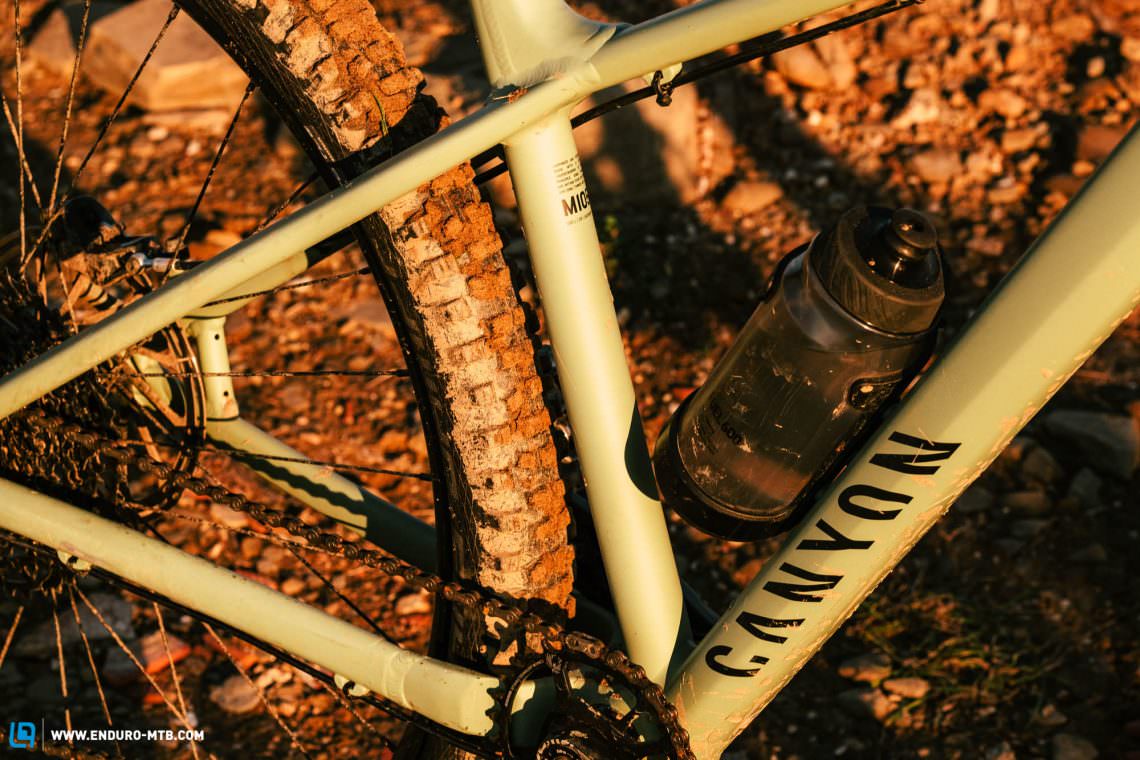
Nothing to see here :) Yes, the shock is “missing”, but in return, you get plenty of unfiltered power when you step on the gas.
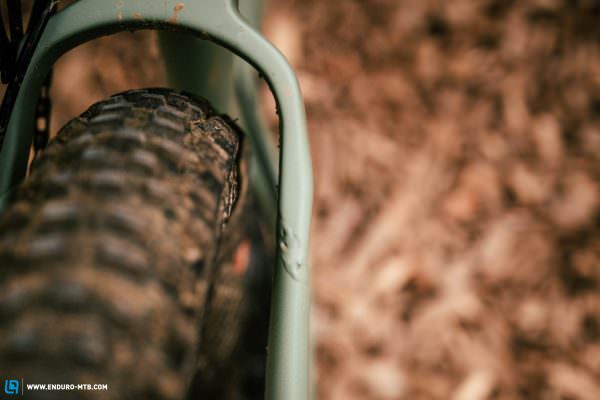
We’re referring to the rough welds on the aluminium frame.
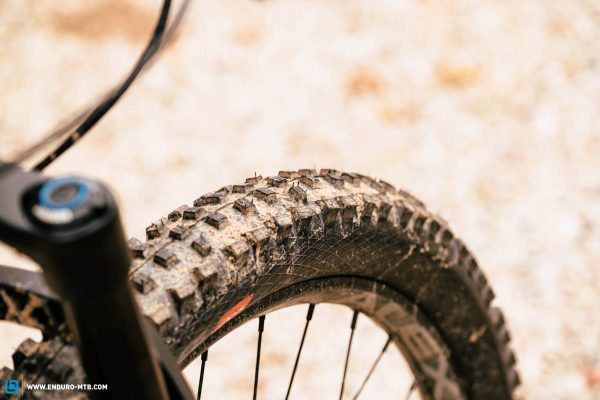
When it comes to the tires, the Stoic does everything right and some bikes could learn a lesson or two from it.
Canyon Stoic 4
€ 1,699
Specifications
Fork RockShox Pike Select 140 mm
Seatpost Iridium Dropper 170 mm
Brakes SRAM Guide T 200/180 mm
Drivetrain SRAM NX Eagle 1x12
Stem Canyon G5 40 mm
Handlebar Canyon G5 Riser 780 mm
Wheelset Alexrims DP30/KT M5er 29"
Tires Schwalbe Magic Mary/Hans Dampf Evo Super Trail 2,35
Technical Data
Size 2XS XS S M L XL
Weight 13.76 kg
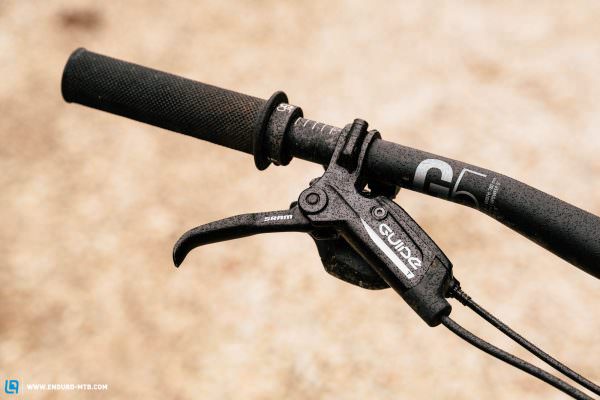
The SRAM Guide T brakes overheat quickly and deliver poor braking performance. This makes them the worst brakes in the test.
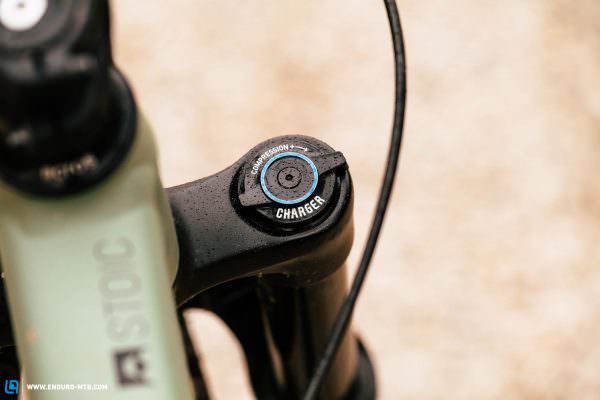
Compared to its more expensive counterparts, the RockShox Pike RC feels harsh, passing on impacts and vibrations onto the rider almost unfiltered.
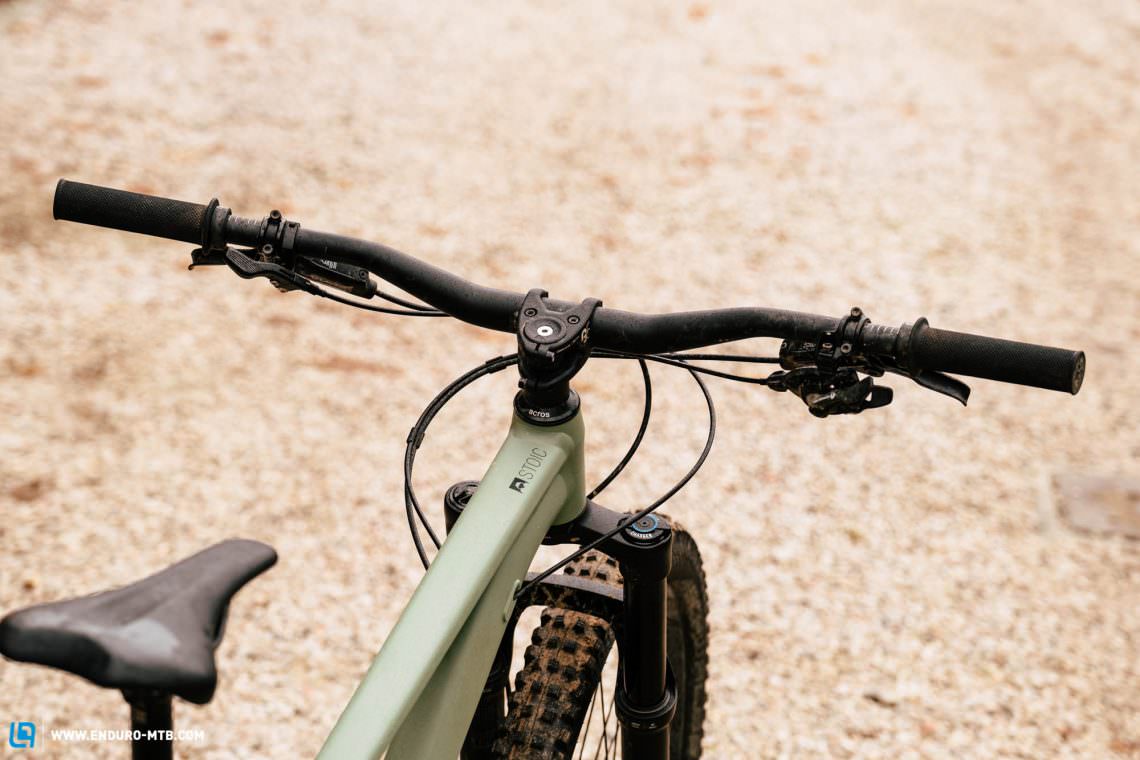
The gear and dropper cables create an odd-looking loop.
The geometry of the Canyon Stoic 4 in detail
Available in a total of six sizes, XXS to XL, there should be a suitable Stoic for everyone between 158 cm to 192 cm tall. The three smaller frame sizes (XXS–S) feature 27.5″ wheels, while the M to XL bikes rely on 29″ wheels. Canyon adapt the geometry of the bike to the respective wheel sizes, with the primary changes being the chainstay length and bottom bracket height. Chainstays are 418 mm on all 27.5” bikes and 428 mm on all frames with 29” wheels. Compared to full suspension bikes, the chainstays are extremely short, regardless of the frame size. Of course, this makes for very agile and nimble handling. Our test bike in size L has a relatively long 480 mm reach and high front (635 mm stack).
| Size | 2XS | XS | S | M | L | XL |
|---|---|---|---|---|---|---|
| Seat tube | 365 mm | 365 mm | 400 mm | 430 mm | 460 mm | 500 mm |
| Top tube | 539 mm | 564 mm | 591 mm | 623 mm | 650 mm | 678 mm |
| Head tube | 90 mm | 90 mm | 100 mm | 90 mm | 100 mm | 110 mm |
| Head angle | 65.0° | 65.0° | 65.0° | 65.0° | 65.0° | 65.0° |
| Seat angle | 75.0° | 75.0° | 75.0° | 75.0° | 75.0° | 75.0° |
| Chainstays | 418 mm | 418 mm | 418 mm | 428 mm | 428 mm | 428 mm |
| BB Drop | 45 mm | 45 mm | 45 mm | 60 mm | 60 mm | 60 mm |
| Wheelbase | 1,104 mm | 1,129 mm | 1,158 mm | 1,193 mm | 1,222 mm | 1,252 mm |
| Reach | 380 mm | 405 mm | 430 mm | 455 mm | 480 mm | 505 mm |
| Stack | 592 mm | 592 mm | 601 mm | 626 mm | 635 mm | 644 mm |
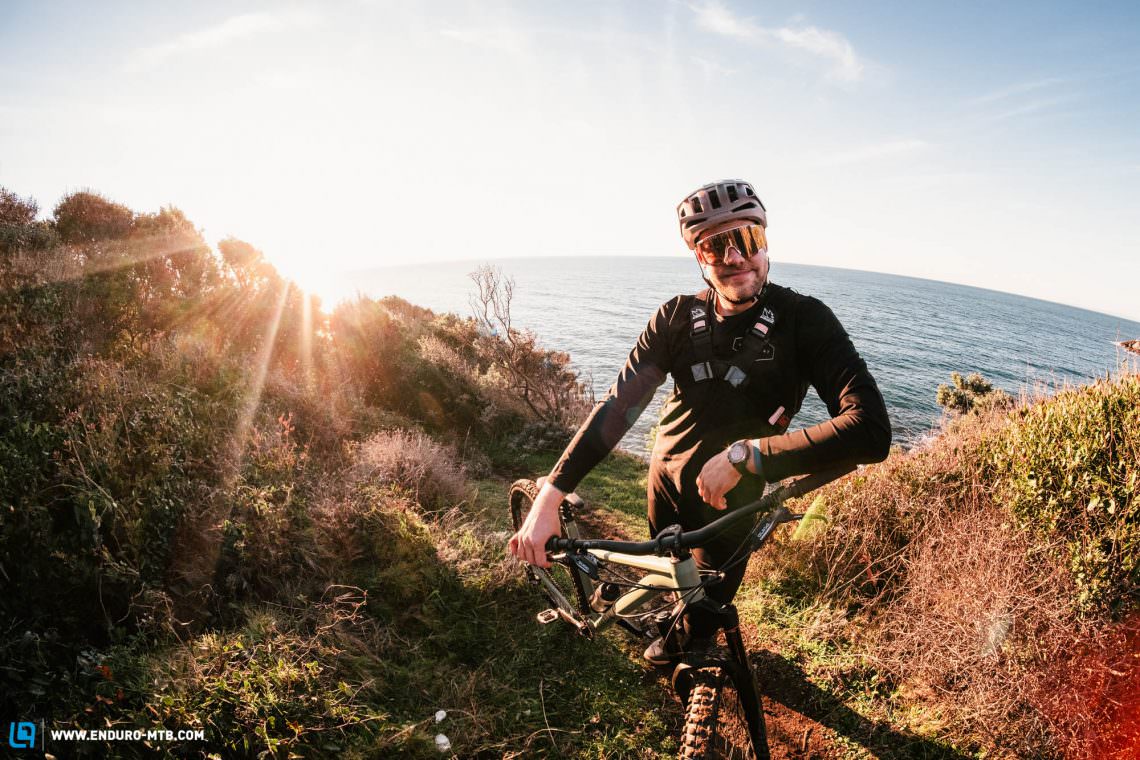
Shorts 100% Airmatic Shorts | Kneepads Chromag Rift | Shoes Giro Chamber II
Socks Stance Supercrew Comp Nano | Watch Wahoo ELEMNT RIVAL
This is how the hardtail behaves on the trail
Uphill, the Canyon Stoic 4 convinces with a comfortable pedalling position. The weight is evenly distributed between the front and rear, resulting in an equal amount of pressure on the hands and saddle. The Stoic is direct and powerful and potentially one of the stronger climbers in this test, provided you choose your line carefully. Nonetheless, you should avoid slippery roots and large obstacles or just ride around them, because the rear wheel gets caught up easily on obstacles and the rigid rear doesn’t absorb impacts. Unlike a full suspension bike, a hardtail has no suspension to sink into meaning its geometry remains unchanged uphill. As a result, the Stoic is easy to control even on steep climbs and the front doesn’t lift inadvertently. On fire roads and flowing trails, it can even keep up with the Trek Top Fuel and Yeti SB115. However, on rough terrain the absence of rear suspension and resulting lack of traction expose the dark side of hardtail bikes.
“Lots of fun for little money,” is the motto of the Stoic. Unfortunately, the poor build quality and dangerous spec hold it back from delivering the goods.
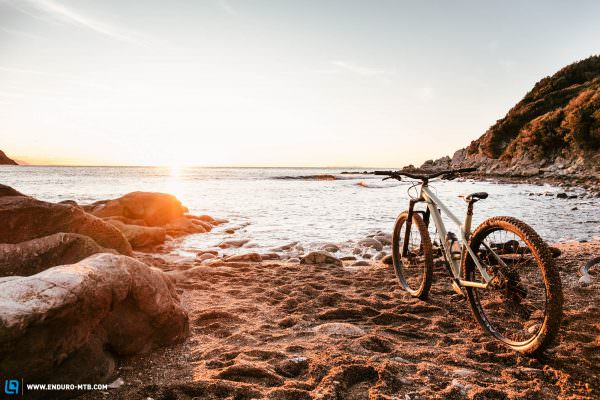
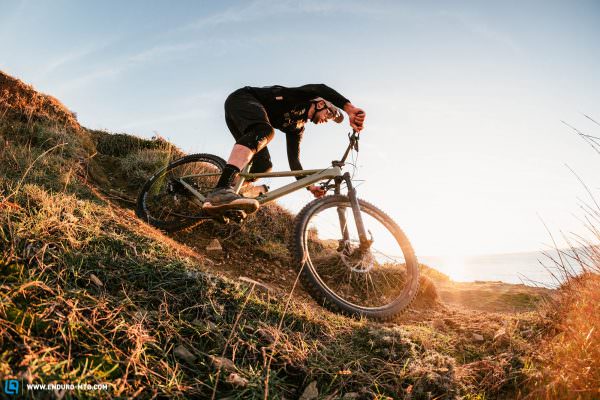
Tuning-tips: upgrade to more powerful brakes | upgrade the wheelset
Thanks to its front-heavy riding position, the Stoic implements steering input willingly and directly downhill, providing very precise handling. It’s intuitive, predictable and easy to control on well-built flow trails and always eager to take off into the air. When the trail gets rougher, the harsh fork spoils the party. Vibrations and hits are passed onto the rider, and not just at the rear, while even the slightest lateral force pushes the Stoic off the chosen line. Not only can this quickly lead to arm pump, but it also results in a lack of traction in corners and under braking. As a result, the Stoic requires you to stay significantly more alert than a full-susser as you have to compensate for the hits and vibrations by shifting your body.
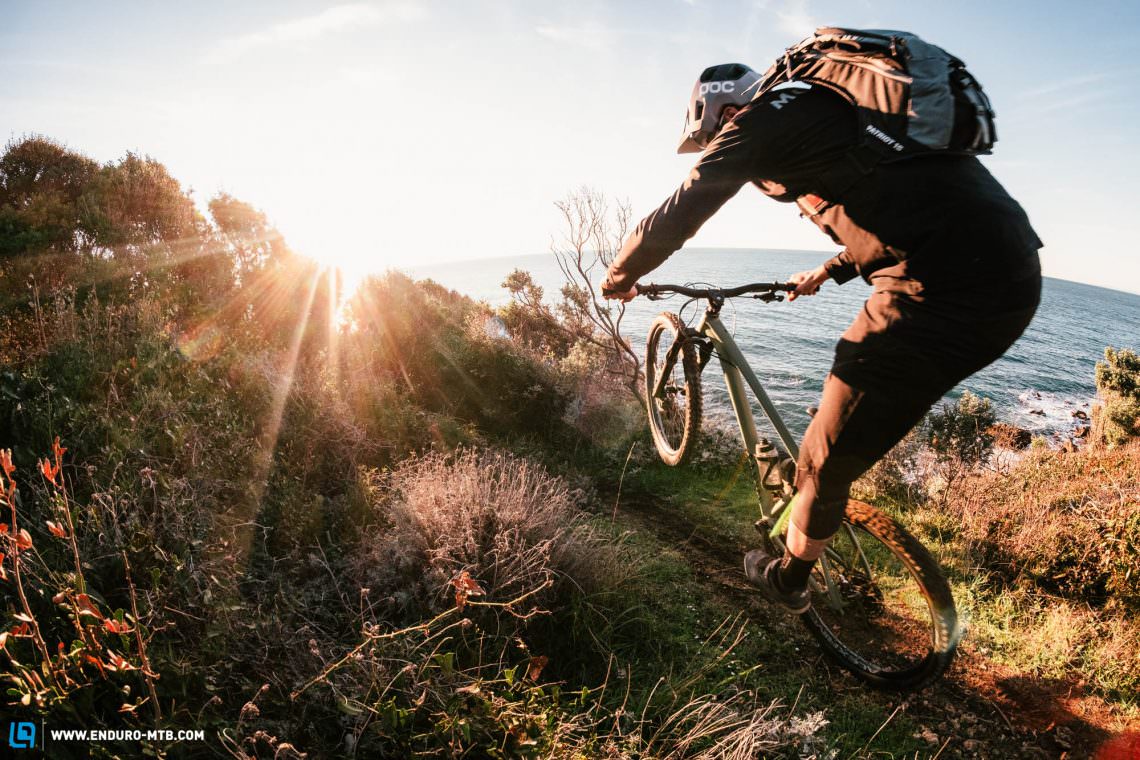
Conclusion
The Canyon Stoic 4 Hardtail is supposed to offer an accessible gateway to trail riding, but completely fails to meet its objective! It’s the cheapest bike in our group test and great fun on easy climbs and manicured flow trails but quickly becomes dangerous on singletracks due to its poor braking performance and poor-quality wheelset. If that wasn’t bad enough, the build quality of the frame is rather rudimentary. While the Stoic 4 is the top-end version of the Stoic range, quite a number of significant safety-relevant flaws in the spec limit the bike’s range of application and thus degree of riding fun. Despite the very affordable price, the Stoic 4 doesn’t offer a good price-performance ratio!
Tops
- comfortable pedalling position
- good climber on easy trails
- precise and direct handling
Flops
- poor build quality
- critical spec, especially the wheels and brakes
- poor value for money, even in light of the low price
Find more information here: canyon.com
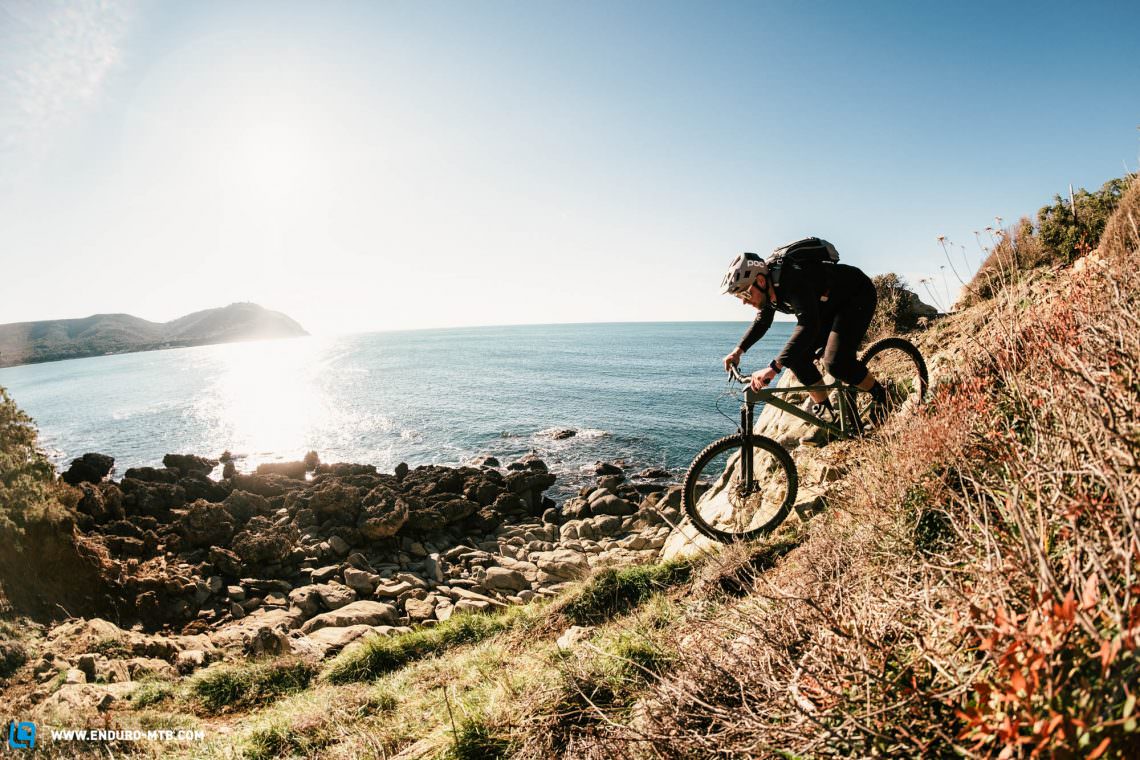
The testfield
Einen Überblick über diesen Vergleichstest erhaltet ihr hier: The best mountain bike of 2021 – 22 models on review
All Bikes in this group test: Canyon Neuron CF SLX 9 (Click for review) | Canyon Spectral 29 LTD (Click for review) | Canyon Stoic 4 | FOCUS THRON 6.9 (Click for review) | Ibis Ripmo V2 (Click for review) | MERIDA eONE-SIXTY 10K (Click for review) | MERIDA NINETY-SIX 8000 (Click for review) | Nukeproof Reactor 290C (Click for review) | Orbea Rise M-Team (Click for review) | Propain Hugene (Click for review) | RAAW Jibb XTR Build (Click for review) | Rocky Mountain Instinct C70 (Click for review) | Santa Cruz 5010 X01 (Click for review) | Santa Cruz Tallboy CC X01 (Click for review) | SCOTT Ransom 900 Tuned AXS (Click for review) | Specialized S-Works Stumpjumper (Click for review) | Specialized S-Works Stumpjumper EVO (Click for review) | Specialized S-Works Turbo Levo SL (Click for review) | Trek Fuel EX 9.8 GX (Click for review) | Trek Top Fuel 9.9 X01 (Click for review) | Yeti SB115 TURQ3 (Click for review) | YT IZZO BLAZE 29 (Click for review)
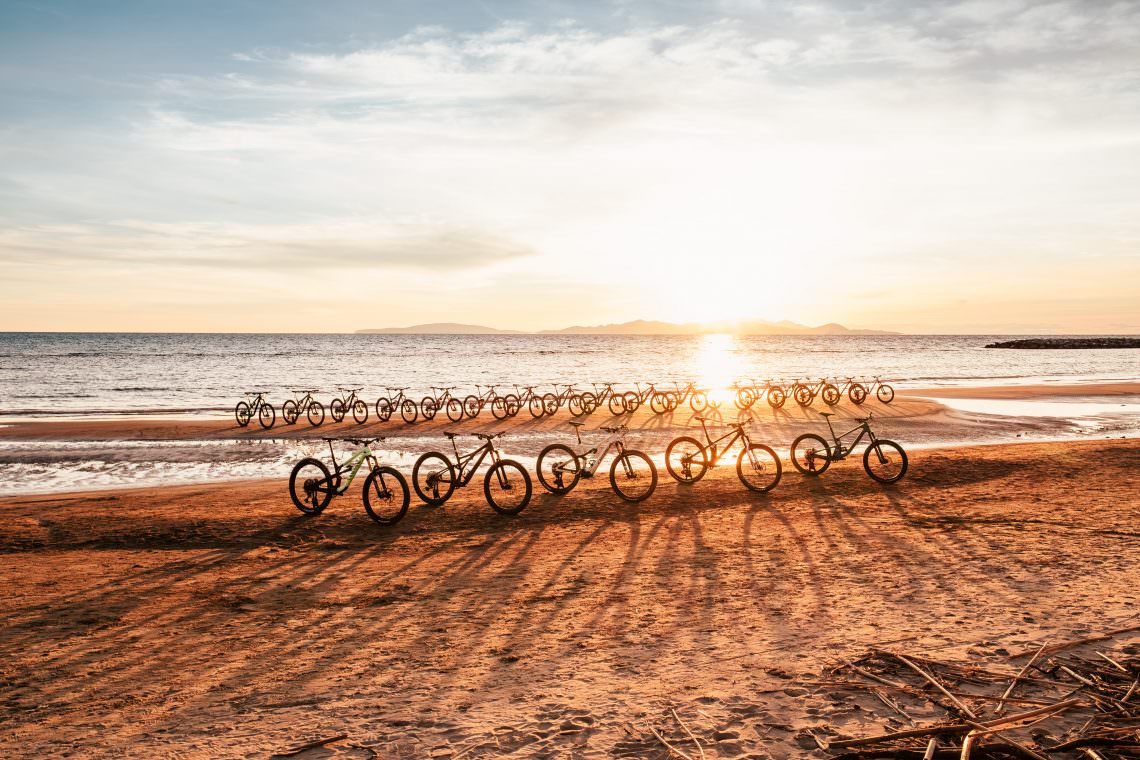
Did you enjoy this article? If so, we would be stoked if you decide to support us with a monthly contribution. By becoming a supporter of ENDURO, you will help secure a sustainable future for high-quality mountain bike journalism. Click here to learn more.
Words: Peter Walker Photos: diverse




